- Home
- Gareth L. Powell
Fleet of Knives Page 7
Fleet of Knives Read online
Page 7
“Good? What do you mean, good?” Grav-units whining, she lowered herself slowly towards the concrete apron. “I’ll have you know I look magnificent.”
When she came within a few metres of the surface, she lowered a cargo pallet. Alva Clay and I walked across the tarmac, shading our eyes from the dust and loose chippings her grav-units were kicking up, and stepped aboard.
A crowd had gathered at the edge of the landing field, drawn by the Trouble Dog’s size. The liners and traders that brought tourists and cargo to this system were larger, but they seldom entered the atmosphere, preferring instead to ferry their charges to the surface using ground-to-orbit shuttles. The sight of something as massive as a Carnivore-class heavy cruiser hanging over the port must have been a novelty for the locals, and an unexpected bonus for the tourists.
I waved.
Clay gave them the finger.
And then we were inside the ship, and I could finally relax. For three days I had been feeling exposed and anxious in the dust and heat of the desert. Now that I was back in the Trouble Dog’s human quarters, I felt that tension ease like a fist unclenching.
Clay walked off in the direction of her cabin, muttering something about getting some well-deserved rack time. When she’d gone, I stripped off the grime-infused rags I’d been wearing, threw aside my goggles and headscarf, and walked back to my room naked, glorying in the feel of cool, conditioned air against my skin.
Later, having dressed in my comfortable old ship fatigues and habitual baseball cap, I ventured into the galley to find Preston Menderes eating cereal, hunched over the glow of a digital textbook.
“Welcome back, Captain,” he said.
Preston had replaced George as the Trouble Dog’s medic. Unfortunately, he had lied his way through the application process, and possessed little in the way of actual experience or qualification. The only reason he was still aboard my vessel was that he’d agreed to study hard in order to bring his knowledge up to the required standard. That, and the fact I’d grown to feel responsible for him since being forced to put a cannon shell through his old man’s head in order to prevent further loss of life at the Gallery.
I walked over to the counter and helped myself to a cup of coffee.
“I think it’s about time you got to know the ship a little better,” I said.
Preston looked puzzled. “I think I know my way around…”
The coffee was hot and strong, and better than anything I’d been offered on the planet below. “That’s not what I’m talking about.”
I took him around the torus of cabins that ringed the Trouble Dog’s waist, until we came to a little-used companionway leading “up” into the ship’s interior.
“What’s up here?”
“Wait and see.”
I led him up the metal rungs, into what had once been storage space for the ship’s complement of marines, but which she had now repurposed for her own use. As we reached the top of the ladder the lights came on, illuminating a large, airy space. Plinths ringed the white-painted walls and formed a double line down the centre of the room, and each plinth held an artefact.
Preston turned around, taking it all in. “What is this?”
“It’s the Trouble Dog’s trophy room.”
“Trophy room?”
A screen lit on the far wall, displaying the ship’s avatar. This morning she was in full goddess mode, with lustrous brown skin, a single long, jewelled earring, and golden threads woven into her dark, tied-back curls.
“I wouldn’t call it that,” she said.
Preston examined the contents of the nearest plinth. “What’s this?”
The object was a jagged splinter of smoke-blackened glass, displayed on a purple silk cushion beneath a clear plastic case.
“That,” the Trouble Dog said, “once formed part of a great stained-glass window in a cathedral on Morag’s Haven.”
Preston frowned.
“Morag’s Haven? Wasn’t that bombed during the early days of the war?”
“It was the first combat mission I flew.”
“And this one?” He was looking at the next plinth, which held a seemingly haphazard mound of bright silver dog tags.
“I was a troop transport at the Battle of Traitor’s Gate.”
“And these are all…?”
“These belonged to the marines that were lost.”
Preston considered the rest of the room. From where we stood we could see plinths holding unexploded grenades, old shell casings, a rusted cutlass, a child’s stuffed rabbit, a powered gauntlet with an inbuilt flamethrower, and several other objects that weren’t immediately identifiable.
“And these other pieces?” he asked. “They’re all souvenirs from your career?”
The Trouble Dog lowered her gaze. “No, not souvenirs.”
“Then what?”
“Commemorations, reminders.”
“I don’t see the difference.”
The Trouble Dog’s avatar clasped her hands together. “Do you see the penultimate plinth?”
“The one with the plant?”
“It is a tree sapling, and it is alive. In another few years I will need to transplant it to a larger container.”
I had seen the contents of this room before, and was aware of the symbolic weight carried by each of the objects on display. Now I tried to see the sapling through Preston’s eyes: a pink and blue stalk about the size of a tulip, with a closed bud at the tip. Fine, quivering hairs ran down its length, and it was encased in a simple glass terrarium to protect it from the dryness of the ship’s recycled air.
“What does this represent?” he asked.
“You’re looking,” the Trouble Dog told him, “at one of the last remaining samples of life from the jungles of Pelapatarn.”
Preston’s eyes bugged. “That’s a sentient tree? I thought they were extinct.”
“Thanks to my sisters and I, they almost are.”
“Then this whole room…”
“This room is a monument to my shame. It contains all the reasons I renounced my commission in the Conglomeration Navy.”
There was one final plinth—a new one. It held a tiny speck of silver mounted in a transparent glass cube.
“And this one?”
“I’d rather not say.”
“But—”
“I don’t think you’re ready.”
Preston’s cheeks coloured. “Ready for what? I’m not a child.”
“Nevertheless, I think it would be unwise for you to insist on knowing where that speck came from.”
The boy’s face was red now, with a mixture of indignation and embarrassment. He turned to me for support, but I simply shrugged.
“It’s your decision,” I said.
The Trouble Dog scowled at me from the wall. “I wish you’d thought to ask before bringing him here,” she said.
I shrugged again. “It had to happen sooner or later.”
“Later would have been preferable.”
“No, I think we need to confront this.”
Preston had been listening with barely concealed impatience. “Confront what?” he asked. “What is it you won’t tell me?”
On the screen, the Trouble Dog rolled her beautiful eyes. “Oh, for heaven’s sake,” she said. “Preston, that fleck of silver paint came from the skin of your father’s Scimitar. It was knocked from the hull while we were drilling our way in, in order to assassinate him by firing a single cannon shell into the top of his head.”
Everything went still. Preston blinked twice. He opened his mouth, and then closed it again. At his sides, his fingers flexed. He tried to speak but the words caught in his throat.
My own pulse was racing. I said, “It’s been months and we’ve not talked about it.”
All I got in return was a horrified look. I tried reaching out to touch his shoulder, but he flinched away.
“Preston—”
He turned and clattered his way down the companionway’s metal steps.
When he had gone, the Trouble Dog sighed. “I think,” she said, “that makes us even.”
Now it was my turn to feel surprised. “What could he possibly have done to justify being treated like that?”
“Don’t you remember?” She raised her chin. “The first time he came aboard, on Camrose Station. He called me an antique.”
I put a hand to my forehead. “That was a year ago.”
“He still shouldn’t have said it.”
I measured the weight of the glass cube in my hands. “You can be a real jerk sometimes, you know that?”
The Trouble Dog remained unrepentant. “He started it,” she said sulkily.
I picked up the cube containing the silver scrap. “You could have broken it to him a little more gently. I wanted to talk about what happened, to make sure he was okay. But no, you had to rub his nose in it.”
The ship’s avatar raised her eyebrows. “Are you saying this is my fault?”
“You could have been a bit less blunt.”
“I’m a warship, Captain. I don’t do ‘less blunt’.” She arranged her face into a defiant pout. “Now, can you please put my cube back down?”
“Oh, I’m going to put it down, all right.”
“What does that mean?”
“It means I’m going to throw it out of the airlock. The last thing Preston needs now is to know it’s on board.”
I strode to the top of the companionway ladder. Behind me, the Trouble Dog said, “Wait!”
“I don’t want to argue about this anymore.”
“Neither do I.” Her tone and posture had changed, becoming more businesslike. “I’m picking up a signal from Camrose.”
I felt my heart sink. Over the past couple of weeks I’d become too used to deciding my own itinerary, and taking the ship wherever I saw fit. Now, a communication from home could only mean a curtailment of that freedom, and a return to active duty.
My anger forgotten, I placed the cube back on its plinth.
“Patch it through.”
CHAPTER ELEVEN
JOHNNY SCHULTZ
I hated leaving Chet, but we had no choice. Addison was right: the ship’s shattered hull might disintegrate at any moment, and then we’d all be screwed. We needed to get back to the others and get into our pressure suits while we still had air to breathe.
I let her lead the way. She knew this ship as well as I did, and she had the ability to make decisions under pressure, and act upon them without hesitation. If we were going to find an escape route, she’d be the one to find it. If I’d tried to lead, we’d still be dithering around in the engine room. Under normal circumstances, I might have described myself as a decisive person; but these circumstances were far from normal, and the losses—first Vito, then Jansen and Monk, then Chet; even the ship itself—had come too quickly, cut too deeply for me to trust my own judgement right now. I needed time to absorb the shock of our situation.
We scrambled up broken ladders and wormed our way around fallen machinery. And all the while, the ship moaned and trembled around us. I felt like crying. Lucy’s Ghost deserved better than this. Chet and the others had deserved better. But there was nothing I could do to help them. No way for me to reset the clock and save them. All I could do was keep taking one step after another, keep my body falling forwards, until we reached the airlock.
Everybody else had his or her suit on, and there wasn’t much room left for us. Our suits hung inside the locker like the skins of flayed ghosts. We dragged them out into the corridor and helped each other dress. With great reluctance I said goodbye to my jacket, leaving it folded on the deck. Then we rejoined our comrades and closed the inner lock door.
“Communications test,” I said into my helmet mike. “Can everybody hear me?”
Five voices answered in the affirmative. I could see their frightened eyes behind their curved faceplates. Each of their suits was of a different make. As security officer, Kelly’s was an army surplus model, with armour plating on the torso and limbs; Dalton’s was the standard orange that denoted a medic; and Santos’s was a bulky blue, heavily patched specimen that looked older than he was. If he’d told me it was a family heirloom, I’d have believed him. Only the accountant, Henri Bernard, had a new-looking suit, conspicuously lacking the grime and scuffs acquired by the rest.
“Where are the others?” Henri asked.
I couldn’t trust myself to speak.
“We’re all that’s left,” Addison said. “Now, have we got the manoeuvring packs?”
Kelly and Dalton gave the thumbs-up. Each had a skeletal frame strapped to their backs, with gas jet nozzles fixed to each corner. Usually, I would have taken one of the packs, but Dalton needed it to help the injured Santos make the jump. The rest of us would use lines to clip ourselves to Kelly, and she would pull us across to the Restless Itch.
“What about the cutting equipment?” I asked.
Santos was leaning against the airlock wall, resting his damaged foot. He patted a cylindrical kit bag.
“I have it here, chief.”
“And weapons?”
“I have them.” Kelly held up a canvas bag. “All the rifles, plus as much ammunition as would fit.”
“Thanks.”
I reached over and took the bag filled with cutting torches from Santos. There was no way he could carry it while limping.
As I straightened up, I noticed Dalton regarding Kelly with sceptical eyes.
“Do you really think we’ll need all those guns?” he asked. “I mean, it’s a derelict ship. Are we really expecting resistance?”
Lena Kelly gave him a look that could have chilled beer.
“You stick to your duties, Gil,” she said, “and let me attend to mine.”
Beneath us, the deck juddered.
“We’d better get that outer door open,” Addison said.
I instructed Bernard and Addison to clip their lines onto Kelly, and Santos clipped his onto Dalton, then I turned to the controls and punched the override. The atmosphere drained from the chamber, and the hatch slid aside to reveal a wash of hard, bright stars. Dressed in our mismatching suits and lashed together in two groups, we tumbled out into the universe.
* * *
For a minute or so, all I could hear was the sound of my breathing. Then I managed to steady myself. Addison, Bernard and I were clipped to Kelly, and she was working the thrusters of her manoeuvring pack, trying to tug us into alignment. A few dozen metres away, I could see Dalton carefully towing Santos.
I glanced back at the Lucy’s Ghost. The collision with the larger ship had crushed the entire starboard side of her bow, and cracked her spine in half a dozen places. Whole sections of her hull had buckled and split, wreathing the wreck in glittering clouds of frozen air and shards of splintered debris. Just seeing her in such a state filled me with sadness and shame. She’d been my home, my livelihood and my friend, and I had failed her.
Pulled around by a tug on my line, I faced the Restless Itch. In the unreal clarity of the vacuum, her charcoal-coloured flank seemed to fill half the sky, and I could see every crag and outcrop on her surface. Dim lights burned in the depths of her craters. The melted-looking domes and antennae protruding from her surface looked like cancerous growths.
How could I have been arrogant enough to contemplate an assault on such a structure? The size of it alone was enough to paralyse. From here, it looked as big as a moon. And it had been travelling for centuries, hauling its way doggedly through the void at speeds far less than that of light. How could I ever have hoped to storm such a leviathan with a handful of crew and a few cutting torches? If we’d tried to explore it without a reliable map of the interior, it could have taken us weeks just to traverse its length, from bow to stern. Just finding the bridge would have necessitated a major expedition. Casing the entire asteroid for valuable artefacts would have taken months.
“Holy shit!” The voice came over the open channel. It sounded like Addison. I swivelled around on t
he end of my tether until I could see her.
“What is it?”
I couldn’t see her face behind her visor, but her gloved hand pointed back in the direction of the Lucy’s Ghost.
“Look,” she said.
With difficulty, I turned until the ship came back into view. And, as I looked at the broken, tumbling ruin, I felt cold fingers close on my gut. Addison was pointing to a spot just forward of the Lucy’s stern, where something had torn a ragged hole in the ship’s flank.
“What’s that?” She sounded puzzled. My mind flashed back to the moments before the crash, to the sinuous black shape I’d thought I’d seen in the mist, and the final strike, when I’d fancied I’d glimpsed a gaping mouth filled with teeth.
I said, “I think we were attacked.”
Addison’s helmet had a lamp. She directed the beam into the wound.
“It doesn’t look like a torpedo strike,” she said.
“I don’t think it is.”
“This section hasn’t been pushed in by an impact, it’s been scooped out. It’s almost as if something took a bite out of us.”
“Something did.”
“You can’t be serious.”
“I saw it. So did Vito, before he… before…”
She turned and I caught a glimpse of her face inside her helmet, lit from beneath by readouts and displays.
“You’re saying a creature did this?” Her eyes were wide with concern and disbelief. Too late, I realised we were still on the open channel, and the rest of the crew would be listening in to our every word.
“Yes,” I said, not caring if they believed me or not. “A big fucking creature with teeth sharp enough to pierce hull plate.”
CHAPTER TWELVE
ONA SUDAK
Buried at the exact centre of the vessel, the Hyena’s bridge was the most secure room on the ship. When I arrived, Commodore Wronski rose from his command chair and saluted.
“Welcome, Captain Sudak.”
For a second, I frowned. Then I realised the Entanglement would have passed on my preference. The ship hadn’t asked which name I preferred solely for its own benefit, but on behalf of everyone else as well.

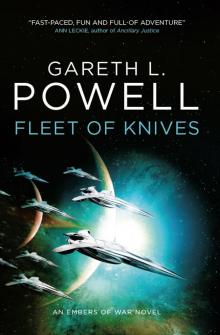 Fleet of Knives
Fleet of Knives Ragged Alice
Ragged Alice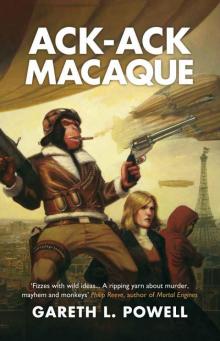 Ack-Ack Macaque
Ack-Ack Macaque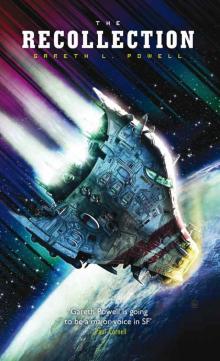 The Recollection
The Recollection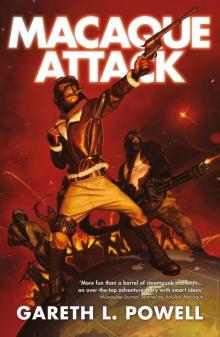 Macaque Attack!
Macaque Attack!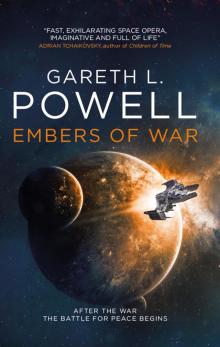 Embers of War
Embers of War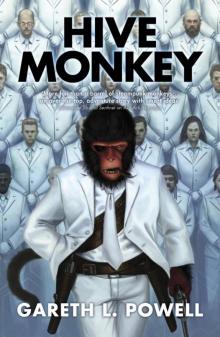 Hive Monkey
Hive Monkey